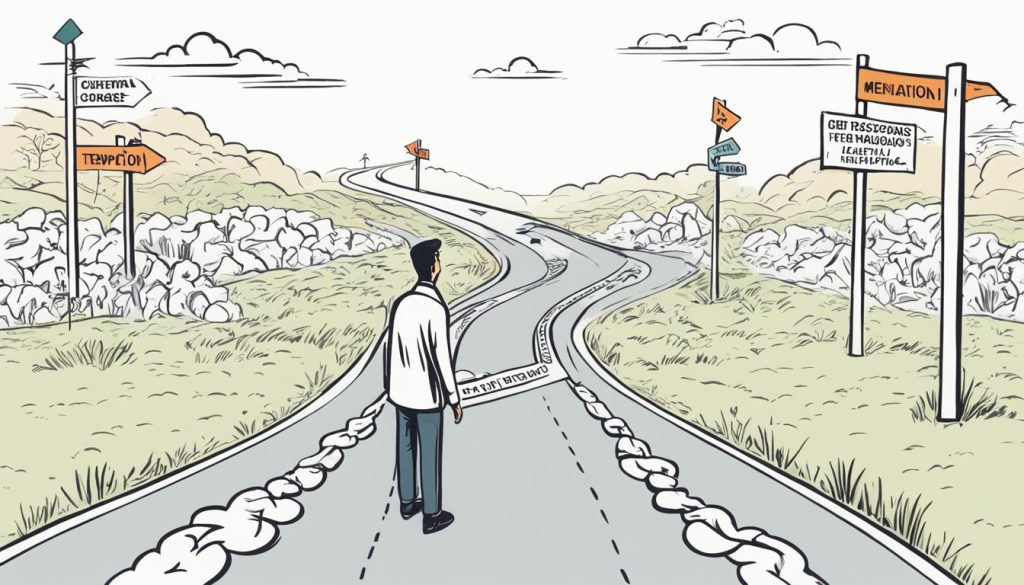As an individual who has personally experienced the challenges of mental health disorders, I understand the importance of preventing relapse and maintaining mental wellness. In this article, I will share effective strategies for preventing mental health relapse, based on research and real-life experiences. By implementing these strategies, you can take proactive steps towards your mental health recovery and reduce the risk of relapse.
Key Takeaways:
- Preventing mental health relapse is crucial for individuals with mental health disorders.
- By implementing effective strategies, individuals can maintain their mental wellness and reduce the risk of relapse.
- Identifying early warning signs is essential in preventing mental health relapse.
- Taking action, such as building coping skills and practicing self-care, is crucial for preventing relapse.
- Adhering to medication and treatment plans is essential for preventing mental health relapse.
Now, let’s dive into the strategies that can help you on your journey towards preventing mental health relapse.
Identifying Early Warning Signs
Identifying early warning signs is a crucial aspect of preventing mental health relapse. By recognizing these signs, individuals can take early intervention measures, reducing the risk of a full relapse and promoting overall well-being.
Early warning signs can manifest in various ways and may differ from person to person. However, there are common indicators that individuals should be mindful of, including:
- Changes in mood: A sudden shift in emotions, such as increased irritability, sadness, or anxiety, can be an early warning sign of a mental health relapse.
- Behavioral changes: Noticeable alterations in behavior, such as social withdrawal, increased agitation, or difficulty concentrating, may indicate a decline in mental well-being.
- Sleep disturbances: Disruptions in sleep patterns, such as difficulty falling asleep, staying asleep, or experiencing excessive sleep, can be indicative of worsening mental health.
- Social withdrawal: Withdrawing from social activities, isolating oneself, or losing interest in hobbies and social interactions can be signs of deterioration in mental well-being.
It is important not to ignore these early warning signs as they provide an opportunity for early intervention and proactive measures to maintain mental wellness. By paying attention to these indicators, individuals can seek appropriate support and implement personalized coping strategies.
Here’s a powerful quote highlighting the significance of identifying early warning signs:
“Recognizing early warning signs is like having an internal compass that guides you towards self-care and prevents the path to a full relapse.” – Dr. Emily Adams, Psychologist
Early intervention is the key to preventing mental health relapse. By promptly acknowledging and addressing these warning signs, individuals can make informed decisions and access the support they need. Implementing coping techniques, seeking therapy, and engaging in self-care practices can significantly contribute to maintaining mental wellness and preventing relapse.
Remember, each person’s experience may vary, so it’s important to consult with mental health professionals for personalized guidance. In the next section, we will delve into the actionable steps individuals can take to prevent mental health relapse and promote overall well-being.
Taking Action

Preventing mental health relapse requires taking proactive measures to maintain emotional well-being. By implementing various actions and strategies, individuals can effectively reduce the risk of relapse and preserve their mental wellness.
To start, building healthy coping skills is essential. Developing effective coping mechanisms enables individuals to navigate challenging situations and regulate their emotions. This can include practicing mindfulness techniques, engaging in creative outlets such as art or music, or participating in physical activities like yoga or meditation.
Identifying and managing stressful situations is another crucial step in preventing relapse. Stress can significantly impact mental health, so it’s important to recognize triggers and implement appropriate coping strategies. Creating a support system and seeking professional help can also provide guidance and assistance during stressful times.
“Taking action is the key to maintaining mental wellness. By actively managing stress, practicing self-care, and building healthy coping skills, individuals can empower themselves and prevent relapse.”
Making self-care a priority is also vital. Engaging in activities that promote self-care, such as practicing good sleep hygiene, eating a balanced diet, staying physically active, and nurturing healthy relationships, helps individuals maintain emotional balance and resilience.
However, it is important to remember that self-care is not limited to activities, but also includes seeking professional help when needed. Consulting with a mental health professional or therapist can provide valuable guidance and support throughout the recovery journey.
Taking action requires determination and commitment, but it is a necessary step in preventing mental health relapse. By building healthy coping skills, managing stress, practicing self-care, and utilizing professional support, individuals can actively safeguard their mental well-being.
Medication and Treatment Adherence
Adhering to medication and treatment plans is crucial for preventing mental health relapse. Following the doctor’s recommendations and continuing medication, even when feeling well, plays a significant role in maintaining stability and reducing the risk of relapse.
I cannot stress enough the importance of consistently taking prescribed medication as part of your treatment plan. Even if you start feeling better, stopping or altering the medication without consulting your healthcare professional can disrupt your progress and increase the likelihood of relapse.
It’s essential to understand that medication adherence is not a sign of weakness but a proactive step towards your well-being. Taking medication as prescribed helps regulate brain chemistry and manage symptoms, contributing to long-term stability.
Additionally, open communication with your healthcare professional is critical. If you experience any side effects or have concerns about your medication, don’t hesitate to discuss them. Your doctor can make adjustments or suggest alternative options that better suit your needs.
Remember, relapse prevention starts with following your doctor’s recommendations and staying committed to your treatment plan.
Establishing a routine for medication intake can also be helpful. Find a method that works best for you, such as setting reminders or using pill organizers. By integrating medication into your daily routine, it becomes easier to adhere to the prescribed schedule.
Lastly, it’s important to note that medication adherence is just one aspect of treatment. Combine it with therapy, self-care practices, and healthy lifestyle choices for comprehensive care.
Benefits of Medication Adherence:
- Stabilizes brain chemistry
- Reduces symptoms of mental health disorders
- Minimizes the risk of relapse
- Improves overall well-being and quality of life
Remember, your mental health journey is unique, and adhering to your medication and treatment plan is crucial for long-term stability. By following your doctor’s recommendations and staying committed, you are taking proactive steps towards preventing relapse and achieving lasting well-being.
Avoiding Triggers

Triggers play a significant role in mental health relapse. It is essential to identify personal triggers and develop effective strategies to manage them. By doing so, individuals can reduce the risk of relapse and maintain their mental wellness.
Identifying Triggers
Identifying triggers is a crucial step in preventing mental health relapse. Triggers can vary from person to person, but some common ones include:
- Stress: High levels of stress can negatively impact mental health and increase the risk of relapse.
- Lack of Support: Feeling isolated or lacking a strong support system can make individuals more vulnerable to relapse.
- Unhealthy Habits: Engaging in unhealthy behaviors, such as excessive alcohol consumption or drug use, can trigger a mental health relapse.
- Major Life Changes: Significant life events, such as a job loss, divorce, or the death of a loved one, can be triggers for mental health relapse.
Recognizing these triggers and understanding their impact on one’s mental well-being is an essential part of prevention.
Managing Triggers
Once triggers have been identified, it is important to develop strategies to manage them effectively. Here are some practical tips:
- Stress Management: Learning healthy coping mechanisms, such as deep breathing exercises, meditation, or engaging in physical activity, can help reduce stress levels and prevent relapse.
- Building a Support System: Surrounding oneself with supportive friends, family, or participating in support groups can provide invaluable emotional support during challenging times.
- Creating Healthy Habits: Adopting a balanced lifestyle that includes regular exercise, a nutritious diet, and sufficient sleep can significantly contribute to mental well-being and reduce vulnerability to triggers.
- Seeking Professional Help: Consulting with mental health professionals who can provide guidance and support tailored to individual needs is crucial in managing triggers and preventing relapse.
By implementing these strategies, individuals can effectively avoid or manage triggers, mitigating the risk of mental health relapse.
Building a Support Network
When it comes to preventing mental health relapse, having a strong support network is essential. The support and understanding of friends, family, and healthcare professionals can make a significant difference in maintaining your mental wellness. In addition, peer support groups and therapy offer invaluable resources to supplement your recovery journey.
Friends and family provide a foundation of love and care that can help you navigate the challenges of mental health. Their presence offers emotional support, encouragement, and a listening ear when you need it most. Sharing your experiences with loved ones can foster a greater sense of belonging and reduce feelings of isolation.
Peer support groups are another invaluable source of support. These groups consist of individuals who have experienced similar challenges and understand firsthand the struggles you may face. Whether in-person or online, peer support groups provide a safe space to share experiences, receive empathy, and gain practical advice for managing your mental health.
“Remember, you are not alone. There are countless others going through similar experiences who can offer guidance and support.”
Therapy is a powerful tool for building a support network. By working with a trained mental health professional, you can explore your thoughts, emotions, and behaviors in a safe and confidential environment. Therapy provides a space for self-reflection, helps develop coping strategies, and equips you with the necessary skills to prevent relapse.
By combining the support of friends and family, participating in peer support groups, and seeking therapy, you create a comprehensive support network that strengthens your resilience and enhances your chances of successfully preventing mental health relapse.
Benefits of a Support Network:
- Emotional support from friends and family
- Understanding and empathy from peers in support groups
- Access to practical advice and coping strategies
- A safe and confidential space for self-reflection through therapy
Remember, your support network is there to help you through the ups and downs of your mental health journey. Never hesitate to reach out and lean on those around you when needed.
Conclusion
Preventing mental health relapse requires a holistic approach that combines various techniques and interventions. By proactively identifying early warning signs, taking action, adhering to medication and treatment, avoiding triggers, and building a strong support network, individuals can significantly reduce the risk of relapse and maintain their mental wellness.
Implementing these relapse prevention tips, along with recognizing the importance of seeking professional help when needed, enables individuals to embark on a successful recovery journey. Combining psychological relapse prevention strategies with a holistic approach to mental health relapse empowers individuals to take control of their well-being.
It is essential to focus on preventing mental health relapse early by being aware of the psychological relapse prevention techniques and interventions available. By utilizing these prevention methods, individuals can develop the resilience and coping skills necessary to navigate challenges along their recovery path. Remember, you have the power to maintain your mental wellness and live a fulfilling life.
FAQ
Why is preventing mental health relapse important?
Preventing mental health relapse is crucial for individuals with mental health disorders to maintain their wellbeing and reduce the risk of relapse.
What are some early warning signs of a mental health relapse?
Early warning signs can include changes in mood, behavior, sleep patterns, and social withdrawal. Recognizing these signs allows individuals to take early action and prevent a full relapse.
What actions can I take to prevent mental health relapse?
Building healthy coping skills, identifying and managing stressful situations, maintaining a self-care routine, and seeking professional help when needed are all key strategies for preventing relapse.
Why is medication and treatment adherence important in preventing mental health relapse?
Adhering to medication and treatment plans as recommended by a doctor is essential for preventing relapse. Open communication with healthcare professionals and adjusting the treatment plan when needed is also important.
How do triggers impact mental health relapse?
Triggers, such as stress, lack of support, unhealthy habits, and major life changes, can contribute to mental health relapse. Identifying personal triggers and developing strategies to manage them is important in preventing relapse.
How does a support network help in preventing mental health relapse?
Having supportive relationships with friends, family, and healthcare professionals, as well as joining peer support groups or seeking therapy, can provide additional support during the recovery journey and reduce the risk of relapse.
What is the holistic approach to preventing mental health relapse?
Preventing mental health relapse requires a holistic approach that includes identifying early warning signs, taking action, adhering to medication and treatment, avoiding triggers, and building a strong support network. Seeking professional help when needed is also essential.

